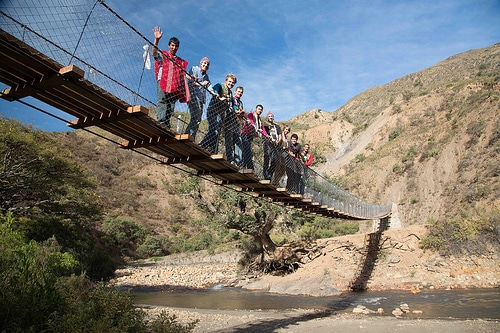
David E. Schaad
david.schaad@duke.eduProfessor of the Practice of Civil and Environmental Engineering
In addition to multidisciplinary courses, students take part in an immersive, real-world experience implementing a designed solution in the field—in the United States or abroad.

Global development engineers partner with people on projects that improve their lives. This can include projects addressing issues such as economic empowerment, environmental quality and access to health care.
This Duke undergraduate certificate combines technical training, problem-solving skills and cultural competency with a month-long, hands-on project that makes a difference for people where they live.
Under Duke policy, students may only double-count two (2) courses for this certificate and their major.
If you are counting CEE 315 Engineering Sustainable Design and the Global Community as an Upper-Level Elective, then you will only be able to “count” one (1) of your required major classes for the certificate and will need to take an additional technical course in CE/EnvE, or from outside the department.
If you are counting BME 462 Design for the Developing World as your required BME capstone, then you will only be able to “count” one (1) of your required major classes for the certificate and will need to take an additional technical course in BME, or another department, to fulfill the certificate requirements.
Select one
Select one each from:
Must be a functional proficiency course, level 203 or higher, or a corresponding curricular competency course in another culture with an explicit focus or major goal being cultural competency, from one of the following Duke academic departments:
Examples include:
Policy
Examples include:
Economics
Examples include:
Examples include:
Examples include:
*ENRGYEGR 490.xx. special topics courses are new, and will be assigned different, permanent courses numbers in future academic years.
Examples include:
Select one:
During the experiential component, you implement a designed solution to an identified need.
This can be accomplished during a DukeEngage experience, or by participating with organizations such as Engineers Without Borders USA and Duke Engineers for International Development.
The component is typically a month-long experience in a setting, within the United States or internationally, where you team with a community partner to identify, design and implement your idea.
In advance of completing their experiential component, the student (or group of students) should email Certificate Director David Schaad a brief, one-page summary of the proposed experience that provides these five items:
If this is a summer experience, please submit this email by the beginning of Spring Break in the semester prior to when the summer experience is going to be conducted.
The committee will meet to consider all submissions and will provide feedback to the students by April 10 about their proposal and if the project is approved for meeting the certificate requirements.
If the proposal is approved, a post-implementation report will be required following the completion of the experience demonstrating how the learning objectives were achieved, the partnership was enhanced, and student reflections on the experience.

Professor of the Practice of Civil and Environmental Engineering